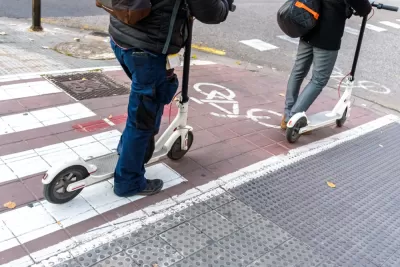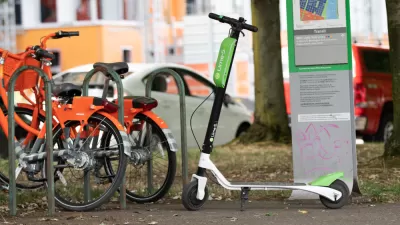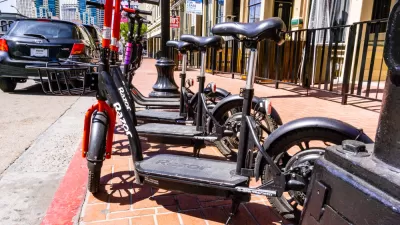In the age of new technology, is it better to ask for forgiveness, or beg for permission? Austin Brown and Kelly Fleming of UC Davis explore why companies have taken this approach and how policymakers and business leaders can improve the situation.

Grace Hopper, a pioneering computer scientist, popularized the saying that it's better to ask for forgiveness than permission. This approach is common for quickly evolving technologies; breakthroughs often come from breaking the rules a bit. Napster's rule breaking resulted in a lawsuit and its ultimate demise, but their concept of sharing songs online completely transformed the way we listen to music.
Recently, failing to ask permission has become almost a mantra of new business models in the transportation sector. Silicon Valley in particular has a policy of "move fast and break things," which has helped to make it the economic powerhouse it now is. However, that approach has created problems. Uber's aggressive, "consequences-be-damned" approach to expanding into new cities set up years of conflicts with city governments. Companies like Bird and Lime offering electric scooters and dockless bikes have generated a backlash as new modes of transportation clash with old, and damaged or poorly parked scooters and bikes litter some streets. Some cities, like Cambridge and Somerville, Massachusetts have banned these scooters outright after Bird initially deployed them without permission or warning.
This is certainly not a new phenomenon. In mid-1800s New York City, traffic congestion was an ever-increasing problem (sound familiar?). Horse-drawn carriages and early motorbuses clogged Broadway, slowing travel to a crawl. Some people came up with a solution—move transportation beneath the streets! But with little precedent for underground transit anywhere in the world, public officials were hesitant to risk being the first.
That didn't stop Albert Beach. Using his own $350,000, and without any permission, the patent lawyer-turned-inventor dug a single-block tunnel and installed a pneumatic tube that carried 22 passengers in a car propelled by compressed air. Beach's specific idea wasn't ultimately scalable, but it demonstrated what was possible. Beach's boldness begat the New York City subway.
More recently, transportation companies have made inroads into new markets by failing to ask for permission, upending the transportation status quo and providing desperately needed alternative transportation options. But such aggressive approaches have also spoiled many relationships in the process. It's easy to decry the behavior of these companies, and some of the blame is legitimate. But if we're serious about improving transportation, it's more important to ask why so many innovators in transportation have decided that asking for permission is not a viable option.
The answer may be that our policy environment is too rigid. When the system makes it too difficult to test out creative ideas, it stands to reason that those with creative ideas will take them outside the system.
The Beach example holds clear parallels to the disruptive behavior of today's transportation innovators. Consider ridesharing. Regulations governing for-hire vehicles like taxis are extremely burdensome. Nowhere is this truer than in New York City. NYC taxis can't operate without a taxi medallion, and local government has long limited the medallion supply as a way to inflate prices and generate revenue. This was a good system for the few who got rich investing in medallions (in 2014, the price of a medallion topped out at $1.3 million!), but not so good for taxi users. Under these strict rules, companies like Uber had no choice but to enter the Big Apple using fly-by-night tactics.
New mobility options like electric scooters, dockless bikes, and other forms of "micromobility" are another instance where inconsistent policy guidelines have created headaches. Media is quick to point out the problems these devices cause, and these problems are real. But leaders should keep in mind that new mobility options wouldn't have proliferated so quickly if there weren't an unmet demand for them. In most cities, there was no protocol to set up an agreement between a new mobility company and city transportation officials. The policy environment simply wasn't encouraging experimentation with alternatives to cars that provide easy, on-demand, point-to-point travel.
Cities and regions should establish clear, accessible policies that allow new partnerships with mobility companies. Small companies cannot spare large amounts of resources to engage in traditional government procedures, so these policies should allow for more natural interactions between company leaders and governmental staff. Partnerships should start as pilots and include rigorous reporting to help track both benefits and unintended consequences. There are a few hopeful signs that cities are trying to work with new mobility companies to set up agreements that benefit the providers, cities, and users of transportation while supporting the necessary infrastructure. For example, Sacramento has laid out policies on parking and deployment in disadvantaged communities.
People want more and improved transportation options. Innovation and experimentation have the potential to reduce traffic, mitigate pollution, cut costs, and enhance safety across our transportation systems. But for new ideas to be introduced responsibly, policymakers need to adopt a yes-first attitude. There must be better ways for individuals and businesses to try new models, with oversight that is sufficient but not excessive, then scale them up if they work well. If we want transportation tinkerers to ask for permission, we have to make it easier for them to get it.
Austin L. Brown, Ph.D., is the executive director of the UC Davis Policy Institute for Energy, Environment, and the Economy.
Kelly Fleming, Ph.D., is an energy and transportation policy analyst at the UC Davis Policy Institute for Energy, Environment, and the Economy.

Study: Maui’s Plan to Convert Vacation Rentals to Long-Term Housing Could Cause Nearly $1 Billion Economic Loss
The plan would reduce visitor accommodation by 25,% resulting in 1,900 jobs lost.

North Texas Transit Leaders Tout Benefits of TOD for Growing Region
At a summit focused on transit-oriented development, policymakers discussed how North Texas’ expanded light rail system can serve as a tool for economic growth.

Using Old Oil and Gas Wells for Green Energy Storage
Penn State researchers have found that repurposing abandoned oil and gas wells for geothermal-assisted compressed-air energy storage can boost efficiency, reduce environmental risks, and support clean energy and job transitions.

Texas State Bills Could Kill Transit Funding in Dallas, Austin
State lawmakers could pull funding from the state’s largest transit agency and the ambitious Project Connect, a voter-approved transit project in Austin.

Opinion: DC Encampment Sweeps Hide, but Don’t Solve, Homelessness
President Trump recently ordered the clearing of encampments built by unhoused people on federal land in Washington, D.C.

Santa Barbara Could Build Housing on County Land
County supervisors moved forward a proposal to build workforce housing on two county-owned parcels.
Urban Design for Planners 1: Software Tools
This six-course series explores essential urban design concepts using open source software and equips planners with the tools they need to participate fully in the urban design process.
Planning for Universal Design
Learn the tools for implementing Universal Design in planning regulations.
Ascent Environmental
Borough of Carlisle
Institute for Housing and Urban Development Studies (IHS)
City of Grandview
Harvard GSD Executive Education
Toledo-Lucas County Plan Commissions
Salt Lake City
NYU Wagner Graduate School of Public Service





























